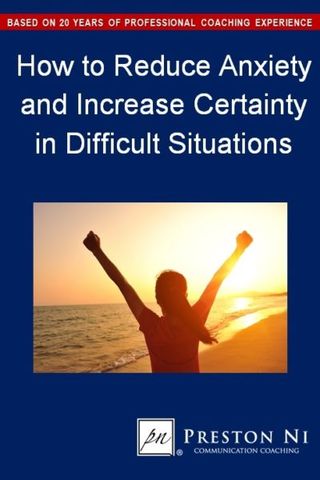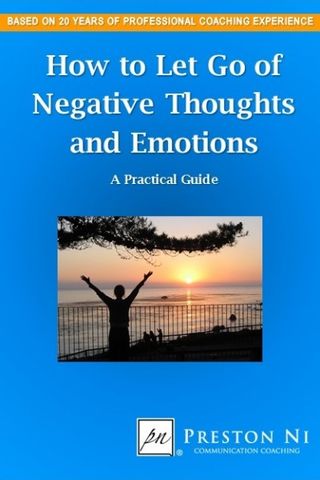
Most people experience anxiety at certain points in their lives. It can occur in a professional or personal environment. The good news is that there are many ways to lessen anxiety in a difficult situation, while increasing your feelings of confidence, certainty, and peace.
Below are five quick countermeasures to help reduce anxiety. Some of these tips may seem simple, but studies have shown that they produce instant and powerful results*. Note that these are "quick fixes" to help lower anxiety symptoms. To learn how to powerfully and fundamentally handle anxiety producing issues, whether they involve your job, family, romance, friends, finance, health, or personal endeavor, see my book (click on title): "How to Reduce Anxiety & Increase Certainty in Difficult Situations - A Practical Guide".
1. Take Deep Breaths
When we experience anxiety, our heart rate increases, the breath quickens, and the body begins to tense. Shallow breathing, in particular, reduces the oxygen available to the brain, and inhibits our ability to think clearly.
The moment you experience anxiety, take long, deep breaths (go ahead and try this now if you like). Do this repeatedly, and be sure you’re breathing into and out of your diaphragm. If you’re not familiar with diaphragmatic breathing, simply push in your stomach gently with one hand as you breathe out to let the stomach contract, and allow your stomach to expand as you breathe in. Breathe deeply as many times as you need to experience greater calm. If you’re indoors, it also helps to open a window or go outside, and deeply take in fresh air.(1)(2)
2. Move Your Body
If you feel tension in your body, stand and jog in place, shake your arms and legs to release nervous energy. Continue to take deep breaths as you move your body. If time permits, engage in exercises such as running, aerobics, yoga, weight-lifting, swimming, etc., to both reduce stress and increase your cognitive ability. Multiple studies have shown a positive correlation between movement, physical exercise and stress reduction across different age groups.(3)(4)(5)(6)
3. Put Water On Your Face
You can also try putting some cold water on your face, which triggers the mammalian diving reflex, and instantly slows the heart rate. If you're wearing make-up, put cold water behind and in front of your neck instead.(7)(8)
4. Avoid Caffeine and Sugar
If you drink caffeinated beverages, or eat surgery snacks or foods, avoid them during periods of anxiety. Research shows that both caffeine and sugar can increase stress level. Caffeine, in particular has been shown to increase diastolic blood pressure, anxiety, and sweating.(9)(10)(11)(12) Instead of coffee...
5. Drink Chamomile Tea
Studies indicate that drinking caffeine-free chamomile tea has a calming effect, often quickly. Research from the University of Nottingham Medical School suggests chamomile has a relaxing effect on blood vessels, as well as muscle fibers.(13)(14)
After you deploy quick countermeasures to help reduce anxiety, the next step is to take a look at the anxiety inducing issue, and proactively solve the problem. In my book (click on title): "How to Reduce Anxiety & Increase Certainty in Difficult Situations - A Practical Guide", you will learn how to reduce uncertainty about the future, ways to diminish catastrophic thinking, how to change the fear of rejection, keys to decrease or eliminate negative self-talk, and five powerful and assertive problem-solving skills.
Anxiety, at its core, is a survival instinct. Properly managed and channeled, you can turn nervousness into strength, fear into resiliency, stress into confidence, and uncertainty into opportunity!
For more on personal and professional success, see my books (click on titles):


"How to Let Go of Negative Thoughts & Emotions - A Practical Guide"
"Are You Highly Sensitive? How to Gain Immunity, Peace, and Self-Mastery!”
Preston Ni, M.S.B.A. is available as a presenter, workshop facilitator, and private coach. For more information, write to commsuccess@nipreston.com, or visit www.nipreston.com.
© 2016 by Preston C. Ni. All rights reserved worldwide. Copyright violation may subject the violator to legal prosecution.
*In cases of severe mental or emotional distress, seek medical and mental health professionals for support.
Select References
(1) Amen, Daniel G. Change Your Brain, Change Your Life. Three River Press (1999).
(2) Goldin, Philippe R.; Gross, James J. Effects Of Mindfulness-Based Stress Reduction (MBSR) On Emotion Regulation In Social Anxiety Disorder.
Emotion Special Section: Mindfulness Training and Emotion Regulation: Clinical and Neuroscience Perspectives (2010),
(3) Bahrke MS, Morgan WP. Anxiety Reduction Following Exercise and Meditation. Cognitive Therapy and Research (1978).
(4) Carek PJ, Laibstain SE, Carek SM. Exercise for the Treatment of Depression and Anxiety. Int J Psychiatry Med. (2011).
(5) Juliano LM, Griffiths RR (2004). Herring, MP; O'Connor, PJ; Dishman, RK (2010). The Effect of Exercise Training on Anxiety Symptoms Among Patients: A Systematic Review. Archives of Internal Medicine.
(6) Larun, L; Nordheim, LV; Ekeland, E; Hagen, KB; Heian, F. Exercise In Prevention and Treatment of Anxiety And Depression Among Children And Young People. The Cochrane Database of Systematic Reviews (2006).
(7) Speck DF, Bruce DS. Effects of Varying Thermal and Apneic Conditions on the Human Diving Reflex. Undersea Biomed Research (1978).
(8) Grahame I F, Hann I M. Use of the Diving Reflex To Treat Supraventricular Tachycardia in an Infant. Arch Dis Child (1978).
(9) Bruce, Malcolm; Scott, N; Shine, P; Lader, M. Anxiogenic Effects of Caffeine in Patients with Anxiety Disorders. Archives of General Psychiatry (1992).
(10) Bruce, M. S.; Lader, M. Caffeine Abstention in The Management of Anxiety Disorders. Psychological Medicine (2009).
(11) Hughes, RN. Drugs Which Induce Anxiety: Caffeine. New Zealand Journal of Psychology (1996).
(12) Trudy, Scott. The Antianxiety Food Solution: How the Foods You Eat Can Help You Calm Your Anxious Mind, Improve Your Mood, and End Cravings. New Harbinger Publications (2011).
(13) Amsterdam JD, Li Y, Soeller I, Rockwell K, Mao JJ, Shults J. A Randomized, Double-Blind, Placebo-Controlled Trial of Oral Matricaria Recutita (Chamomile) Extract Therapy for Generalized Anxiety Disorder. J Clin Psychopharmacol (2009).
(14) Roberts RE, Allen S, Chang AP, etc. Distinct Mechanisms of Relaxation to Bioactive Components from Chamomile Species in Porcine Isolated Blood Vessels. Toxicol Appl Pharmacol (2013).




